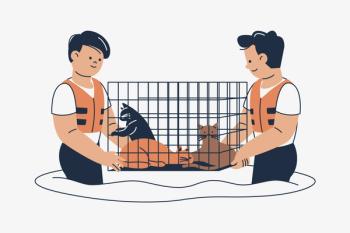
Rule-outs for canine separation anxiety
This stressful disorder in dogs is getting more attention from veterinarians these days, but its important to rule out other issues before diagnosis, says Dr. Wayne Hunthausen.
Before you lock in a diagnosis of separation anxiety for a patient,
He discussed other issues that can lead to signs mimicking separation anxiety in a talk at
Home wrecker?
Destructive behavior focused on doors, windows and the pet owner's personal items, which carry the owner's scent, could be related to separation anxiety if they're happening in the first 30 to 60 minutes after the owner's departure, according to Dr. Hunthausen. But ask enough questions when you
- teething
- play
- investigative behavior
- hunger
- nesting
- noise phobias
- confinement anxiety
- inadequate exercise or stimulation
- mice (some dogs will scratch and dig at walls and flooring when they hear them)
- territorial behavior triggered by seeing dogs or people outside that leads to chewing around windows and doors.
“If the dog is [calmly] sitting on the couch when you leave, and you come back five hours later and the couch is destroyed,” that's likely not separation anxiety, Dr. Hunthausen says.
Trapped!
Confinement anxiety can cause pets to show signs of panic and engage in destructive and escape behavior because they feel trapped in the house or a part of the house-not because they're missing people.
Consider Basil, a 7-year-old female Bouvier des Flandres, that started chewing up a door and the linoleum under it. What changed? New carpeting meant the pet owners kept Basil confined in the kitchen when she used to have run of the house-a confinement anxiety issue, according to Dr. Hunthausen.
Oh, crap …
Pets with separation anxiety are liable to eliminate every time the pet owner is away. Some do it soon after or even during the owner's departure. But other causes of house soiling Dr. Hunthausen says should be ruled out include:
- schedule changes
- diet changes
- too-long periods of confinement
- gastrointestinal disease
- lower urinary tract disorders
- incontinence
- medical problems that cause polyuria or diarrhea
- medications that increase the volume or frequency of elimination
- urine marking
- cognitive dysfunction
- training issues.
The big one, says Dr. Hunthausen, is that last one-in most of those cases, pets also soil when the owner is at home.
The medical workup can help you discover diet changes, disease processes and medication issues. Digging deeper into where the pet eliminates as well as the pet's temperament, sexual status and reactivity may provide clues regarding marking problems, Dr. Hunthausen says.
Does behavioral practice get you pumped?
Dr. Hunthausen shared with us a few years ago how to
Whines, whimpers and barks
Vocalizations associated with separation anxiety may include crying, whining, yipes, howls and barking. In cases of separation anxiety, these usually start up as the pet owner leaves. Another sign that vocalizations are brought on by separation anxiety is if they occur when the owner is home and the pet can't get to the owner.
You probably know all the other usual suspects for canine vocalizations:
- physical discomfort
- alarm barking
- predatory response to prey animals seen through the window
- compulsive disorder
- territorial aggression
- social response to hearing other dogs
- cognitive dysfunction
- other anxiety-related disorders.
A thorough medical workup and a detailed history about when, where and why signs of separation anxiety show up will help you diagnose the right behavioral issue and not miss other behavior or clinical issues along the way.
Newsletter
From exam room tips to practice management insights, get trusted veterinary news delivered straight to your inbox—subscribe to dvm360.




